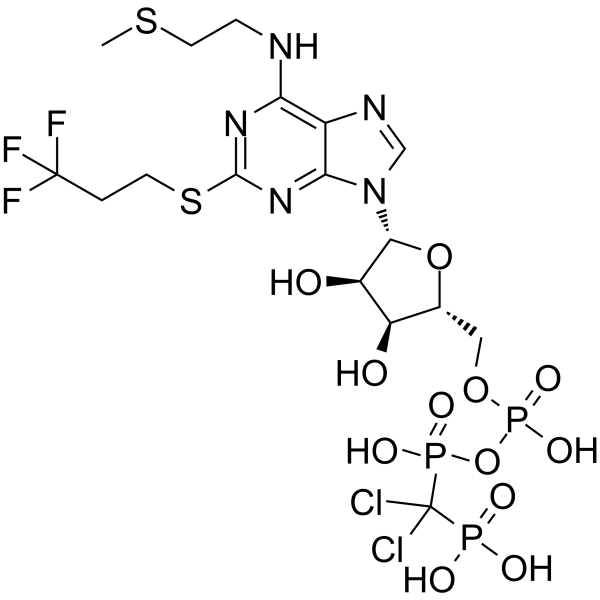Cangrelor
Modify Date: 2024-01-03 13:59:16

Cangrelor structure
|
Common Name | Cangrelor | ||
|---|---|---|---|---|
| CAS Number | 163706-06-7 | Molecular Weight | 776.35900 | |
| Density | 2.087g/cm3 | Boiling Point | 979.004ºC at 760 mmHg | |
| Molecular Formula | C17H25Cl2F3N5O12P3S2 | Melting Point | N/A | |
| MSDS | N/A | Flash Point | 545.882ºC | |
Use of CangrelorCangrelor (AR-C69931MX), an adenosine triphosphate analogue, is an intravenous, reversible and selective platelet P2Y12 antagonist, with prompt and potent antiplatelet effects. Cangrelor directly blocks adenosine diphosphate (ADP)-induced activation and aggregation of platelets. Cangrelor is also a nonspecific GPR17 antagonist[1][2]. |
| Name | [dichloro-[[[(2R,3S,4R,5R)-3,4-dihydroxy-5-[6-(2-methylsulfanylethylamino)-2-(3,3,3-trifluoropropylsulfanyl)purin-9-yl]oxolan-2-yl]methoxy-hydroxyphosphoryl]oxy-hydroxyphosphoryl]methyl]phosphonic acid |
|---|---|
| Synonym | More Synonyms |
| Description | Cangrelor (AR-C69931MX), an adenosine triphosphate analogue, is an intravenous, reversible and selective platelet P2Y12 antagonist, with prompt and potent antiplatelet effects. Cangrelor directly blocks adenosine diphosphate (ADP)-induced activation and aggregation of platelets. Cangrelor is also a nonspecific GPR17 antagonist[1][2]. |
|---|---|
| Related Catalog | |
| Target |
P2Y12 |
| In Vitro | Cangrelor tetrasodium has pKb of 8.6-9.2 for hP2Y12 receptor[3]. |
| In Vivo | Cangrelor tetrasodium (10 mg/kg) not only significantly decreases BLM-induced release of inflammatory cytokines (PF4, CD40 L and MPO), but also decreases the increment of platelets, neutrophils and platelet-neutrophil aggregates in the fibrotic lung and in the peripheral blood of BLM-treated mice[2]. |
| References |
| Density | 2.087g/cm3 |
|---|---|
| Boiling Point | 979.004ºC at 760 mmHg |
| Molecular Formula | C17H25Cl2F3N5O12P3S2 |
| Molecular Weight | 776.35900 |
| Flash Point | 545.882ºC |
| Exact Mass | 774.94800 |
| PSA | 335.94000 |
| LogP | 2.92350 |
| Vapour Pressure | 0mmHg at 25°C |
| Index of Refraction | 1.722 |
| UNII-6AQ1Y404U7 |
| Cangrelor |
| AR-C69931 |